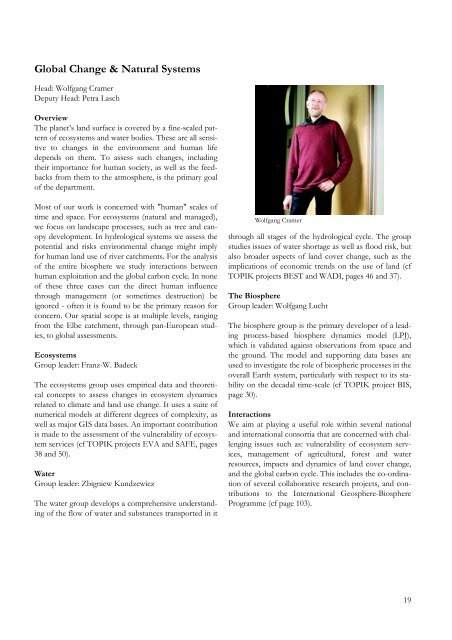PIK Biennial Report 2000-2001 - Potsdam Institute for Climate ...
PIK Biennial Report 2000-2001 - Potsdam Institute for Climate ...
PIK Biennial Report 2000-2001 - Potsdam Institute for Climate ...
Create successful ePaper yourself
Turn your PDF publications into a flip-book with our unique Google optimized e-Paper software.
Global Change & Natural Systems<br />
Head: Wolfgang Cramer<br />
Deputy Head: Petra Lasch<br />
Overview<br />
The planet’s land surface is covered by a fine-scaled pattern<br />
of ecosystems and water bodies. These are all sensitive<br />
to changes in the environment and human life<br />
depends on them. To assess such changes, including<br />
their importance <strong>for</strong> human society, as well as the feedbacks<br />
from them to the atmosphere, is the primary goal<br />
of the department.<br />
Most of our work is concerned with "human" scales of<br />
time and space. For ecosystems (natural and managed),<br />
we focus on landscape processes, such as tree and canopy<br />
development. In hydrological systems we assess the<br />
potential and risks environmental change might imply<br />
<strong>for</strong> human land use of river catchments. For the analysis<br />
of the entire biosphere we study interactions between<br />
human exploitation and the global carbon cycle. In none<br />
of these three cases can the direct human influence<br />
through management (or sometimes destruction) be<br />
ignored - often it is found to be the primary reason <strong>for</strong><br />
concern. Our spatial scope is at multiple levels, ranging<br />
from the Elbe catchment, through pan-European studies,<br />
to global assessments.<br />
Ecosystems<br />
Group leader: Franz-W. Badeck<br />
The ecosystems group uses empirical data and theoretical<br />
concepts to assess changes in ecosystem dynamics<br />
related to climate and land use change. It uses a suite of<br />
numerical models at different degrees of complexity, as<br />
well as major GIS data bases. An important contribution<br />
is made to the assessment of the vulnerability of ecosystem<br />
services (cf TO<strong>PIK</strong> projects EVA and SAFE, pages<br />
38 and 50).<br />
Water<br />
Group leader: Zbigniew Kundzewicz<br />
The water group develops a comprehensive understanding<br />
of the flow of water and substances transported in it<br />
Wolfgang Cramer<br />
through all stages of the hydrological cycle. The group<br />
studies issues of water shortage as well as flood risk, but<br />
also broader aspects of land cover change, such as the<br />
implications of economic trends on the use of land (cf<br />
TO<strong>PIK</strong> projects BEST and WADI, pages 46 and 37).<br />
The Biosphere<br />
Group leader: Wolfgang Lucht<br />
The biosphere group is the primary developer of a leading<br />
process-based biosphere dynamics model (LPJ),<br />
which is validated against observations from space and<br />
the ground. The model and supporting data bases are<br />
used to investigate the role of biospheric processes in the<br />
overall Earth system, particularly with respect to its stability<br />
on the decadal time-scale (cf TO<strong>PIK</strong> project BIS,<br />
page 30).<br />
Interactions<br />
We aim at playing a useful role within several national<br />
and international consortia that are concerned with challenging<br />
issues such as: vulnerability of ecosystem services,<br />
management of agricultural, <strong>for</strong>est and water<br />
resources, impacts and dynamics of land cover change,<br />
and the global carbon cycle. This includes the co-ordination<br />
of several collaborative research projects, and contributions<br />
to the International Geosphere-Biosphere<br />
Programme (cf page 103).<br />
19

















